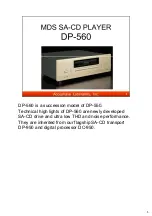
2 Before Repair and Adjustment
Disconnect AC power, discharge Power Supply Capacitors C5802, C5803, C5804, C5912, C5902, C5901, C5916, C5915, C5905,
C5904, C2843 and C2824 through a 10
Ω
, 1 W resistor to ground. DO NOT SHORT-CIRCUIT DIRECTLY (with a screwdriver
blade, for instance), as this may destroy solid state devices.
After repairs are completed, restore power gradually using a variac, to avoid overcurrent.
·
Current consumption at AC 230 V, 50 Hz in NO SIGNAL mode (volume min) should be ~300 mA.
3 Protection Circuitry
The protection circuitry may have operated if either of the following conditions are noticed:
·
No sound is heard when the power is turned on.
·
Sound stops during a performance.
The function of this circuitry is to prevent circuitry damage if, for example, the positive and negative speaker connection wires are
“shorted”, or if speaker systems with an impedance less than the indicated rated impedance of the amplifier are used.
If this occurs, follow the procedure outlines below:
1. Turn off the power.
2. Determine the cause of the problem and correct it.
3. Turn on the power once again after one minute.
Note :
When the protection circuitry functions, the unit will not operate unless the power is first turned off and then on again.
4 Prevention of Electro Static Discharge (ESD) to
Electrostatically Sensitive (ES) Devices
Some semiconductor (solid state) devices can be damaged easily by electricity. Such components commonly are called
Electrostatically Sensitive (ES) Devices. Examples of typical ES devices are integrated circuits and some field-effect transistors and
semiconductor “chip” components. The following techniques should be used to help reduce the incidence of component damage
caused by electro static discharge (ESD).
1. Immediately before handling any semiconductor component or semiconductor-equiped assembly, drain off any ESD on your
body by touching a known earth ground. Alternatively, obtain and wear a commercially available discharging ESD wrist strap,
which should be removed for potential shock reasons prior to applying power to the unit under test.
2. After removing an electrical assembly equiped with ES devices, place the assembly on a conductive surface such as aluminium
foil, to prevent electrostatic charge build up or exposure of the assembly.
3. Use only a grounded-tip soldering iron to solder or unsolder ES devices.
4. Use only an anti-static solder remover device. Some solder removal devices not classified as “anti-static (ESD protected)” can
generate electrical charge to damage ES devices.
5. Do not use freon-propelled chemicals. These can generate electrical charges sufficient to damage ES devices.
6. Do not remove a replacement ES device from its protective package until immediately before you are ready to install it. (Most
replacement ES devices are packaged with leads electrically shorted together by conductive foam, aluminium foil or
comparable conductive material).
7. Immediately before removing the protective material from the leads of a replacement ES device, touch the protective material
to the chassis or circuit assembly into which the device will be installed.
Caution
Be sure no power is applied to the chassis or circuit, and observe all other safety precautions.
8. Minimize body motions when handling unpackaged replacement ES devices. (Otherwise harmless motion such as the brushing
together of your clothes fabric or the lifting of your foot from a carpeted floor can generate static electricity (ESD) sufficient to
damage an ES device).
5
SA-PM91DEE
Summary of Contents for SA-PM91DEE
Page 10: ...9 Operation Procedures 10 SA PM91DEE ...
Page 11: ...11 SA PM91DEE ...
Page 12: ...10 Disc Information 12 SA PM91DEE ...
Page 13: ...13 SA PM91DEE ...
Page 16: ...16 SA PM91DEE ...
Page 32: ...32 SA PM91DEE ...
Page 33: ...33 SA PM91DEE ...
Page 36: ...36 SA PM91DEE ...
Page 39: ...39 SA PM91DEE ...
Page 40: ...40 SA PM91DEE ...
Page 42: ...42 SA PM91DEE ...
Page 43: ...43 SA PM91DEE ...
Page 44: ...44 SA PM91DEE ...
Page 45: ...45 SA PM91DEE ...
Page 46: ...46 SA PM91DEE ...
Page 47: ...47 SA PM91DEE ...
Page 48: ...48 SA PM91DEE ...
Page 49: ...49 SA PM91DEE ...
Page 50: ...50 SA PM91DEE ...
Page 51: ...51 SA PM91DEE ...
Page 52: ...52 SA PM91DEE ...
Page 54: ...12 27 Handling of cassette tape jam Follow the Step 1 Step 6 of Item 12 2 54 SA PM91DEE ...
Page 69: ...69 SA PM91DEE ...
Page 128: ...26 1 Deck Mechanism RAA4110 S 26 1 1 Deck Mechanism Parts Location 128 SA PM91DEE ...
Page 130: ...26 2 CD Loading Mechanism 26 2 1 CD Loading Mechanism Parts Location 130 SA PM91DEE ...
Page 131: ...131 SA PM91DEE ...
Page 133: ...26 3 Cabinet 26 3 1 Cabinet Parts Location 133 SA PM91DEE ...
Page 134: ...134 SA PM91DEE ...
Page 135: ...135 SA PM91DEE ...






































